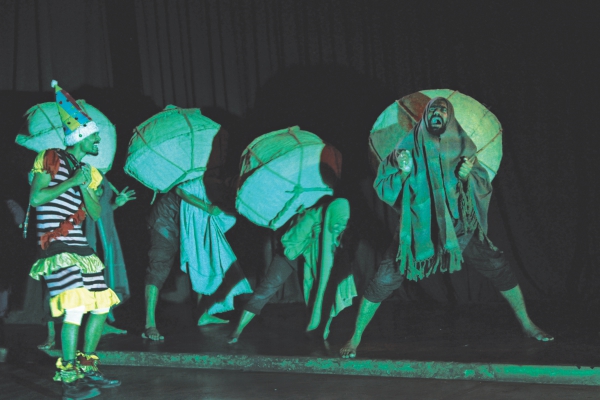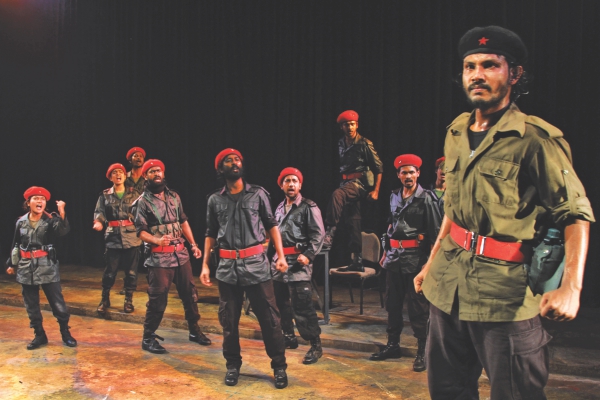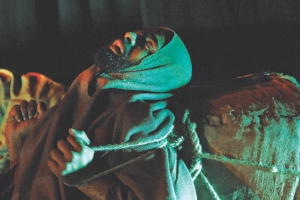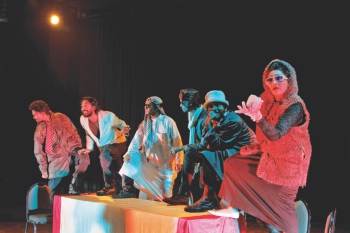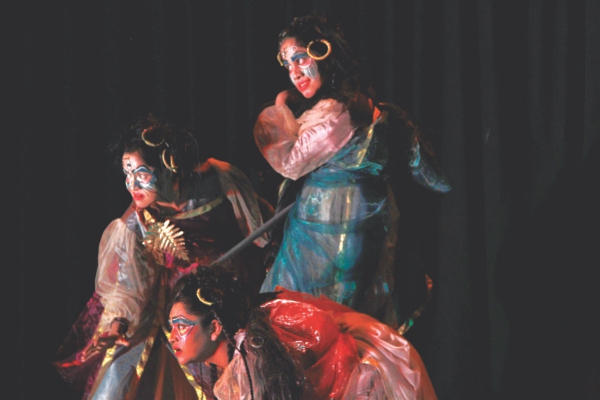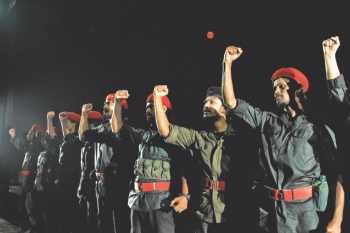| Home - Back Issues - The Team - Contact Us |
 |
| Volume 12 |Issue 02| January 11, 2013 | |
|
|
Theatre The Power of Expression
The Department of Theatre of the University of Dhaka is trying to change society's perception about the arts through dynamic and practical learning Tamanna Khan Photos: Amirul Rajiv The disappointment that creeps in while entering the congested Nat Mondal, the theatre hall of Dhaka University (DU), is washed away watching the bold and intense performance of the students of the Department of Theatre, DU on stage. From January 1 -4, 2013, the outgoing batch of the department performed German playwright Bertolt Brecht's learning play 'The Measures Taken' as part of their practise for the final show in Delhi's National School of Drama (NSD) on January 10. The 35-member theatre team will represent Bangladesh at NSD's 15th Bharat Rang Mahotsav, the largest theatre festival in Asia.
Written in the 1930s when communist revolution promised a radical change for the working class, the realities portrayed in the play appear to be quite current. The story revolves around the mistakes made by a young comrade, who acts from his instinct often defying the initial orders given to him. As a result, his fellow comrades are compelled to kill him for the sake of party's secrecy and security of other members. The young comrade gives his consent to this sacrifice for the greater good of the party.
The young comrade in the play still has a soul that sees things for itself and wants immediate solution. That is why he goes beyond his party orders and talks to the porters, meddles with the oppressive law enforcer at the textile factory and refuses to get into a deal with the business class. One finds the real revolutionary in him and yet he has to sacrifice his life to maintain party discipline. Just as it happens even today, in the play, the party itself becomes bigger than the philosophy that runs it. The young comrade takes the place of a wayward activist of our political parties, a young man who has no choice but to follow party orders. The director of the play, Dr Israfil Shaheen, professor of the department, skilfully relates the play to the present context. Thus, the porters, the textile mill workers, the policemen and even the businessmen and women appear very familiar even in their foreign attire. In fact, the play reminds one of the failures of the leftist parties in Bangladesh in ensuring labour rights. Dr Shaheen says, “This play talks about the ideological clashes of parties. This exists all over the world.”
Beyond the powerful storyline and adept direction, lighting, set design, make up, costume and music, it was the energetic performance by the young group of the Masters final semester students that held the audience captivated throughout the evening. They marched, danced, sang, shouted and made the audience laugh with their witty dialogue and lively expressions. Not for a single moment was the stage left to rest. Before each scene, the performers stood at the proscenium and told the audience what to expect in the upcoming scene. Interestingly, watching the performance, it is very difficult to imagine that theatre study was not the first preference for many of the performers. All Mirza Shakhesep Shakib, playing the role of a comrade, wanted was to study in Dhaka University. “I qualified to study history in Shahjalal University and Jahangirnagar University, but opted to study theatre here because I wanted to be a student of Dhaka University,” he says. Dr Shaheen confirms this situation saying, “Students do not take the university admission test to study this subject.” He explains the general admission system of Dhaka University where subjects such as Economics and English outrank Theatre and Music degrees. So students with lower scores in the admission test are forced to choose a degree subject of a lower ranking.
Yet the vigorous training students of the Theatre department go on throughout the five-year BA (honours) and MA courses, and transforms them into outstanding theatre artistes. “We motivate them and slowly we try to turn them into theatre 'jihadi' (revolutionaries),” says Dr Shaheen. About the prospect of studying theatre, he notes that our education system still cannot ensure that a person can get a job in his/her field of study. “But now studying theatre, people can work in the media. They can do designing, direction and acting in the television media. They can work in films. They can work with NGOs and development organisations, which use popular theatre and culture for development.” In fact, Shakib and his class mate and fellow performer Nila Saha, have already worked for different repertory theatres. Shakib works as light and set designer of Shunnon theatre's 'Lal Jomin' a play based on the Liberation War. Saha, who works regularly in another professional theatre group, says, “Since we have learned acting, we will continue doing theatre. Some of us may work in television channels; some may become academicians, or become light or prop designers. I want to continue working in theatre and finally get into direction.” Both the young artistes today do not regret their decision of studying a subject that many of their batch-mates had shunned. In their hearts, the passion for expressing their thoughts through theatrical performance has already been ignited. The photographs are from the play 'The Measures Taken' performed by Department of Theatre, University of Dhaka. |
||||||||||
Copyright
(R) thedailystar.net 2013 |
